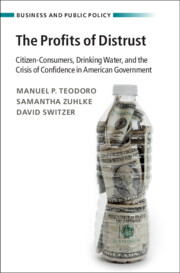 The Profits of Distrust
The Profits of Distrust Book contents
- The Profits of Distrust
- Business and Public Policy
- The Profits of Distrust
- Copyright page
- Dedication
- Epigraph
- Contents
- Figures
- Tables
- Preface
- Acknowledgments
- 1 Basic Services and Trust in Government
- 2 The Profits of Distrust
- 3 (Dis)trust at the Tap
- 4 Hyperopia and Performative Trust
- 5 Speaking Up or Opting Out
- 6 Geographies of Alienation
- 7 When Trust Pays
- 8 Basic Services and Rebuilding Legitimacy
- The Plan
- Book part
- References
- Index
- Other books in the series
2 - The Profits of Distrust
A Political Theory of the Citizen-Consumer
Published online by Cambridge University Press: 18 August 2022
- The Profits of Distrust
- Business and Public Policy
- The Profits of Distrust
- Copyright page
- Dedication
- Epigraph
- Contents
- Figures
- Tables
- Preface
- Acknowledgments
- 1 Basic Services and Trust in Government
- 2 The Profits of Distrust
- 3 (Dis)trust at the Tap
- 4 Hyperopia and Performative Trust
- 5 Speaking Up or Opting Out
- 6 Geographies of Alienation
- 7 When Trust Pays
- 8 Basic Services and Rebuilding Legitimacy
- The Plan
- Book part
- References
- Index
- Other books in the series
Summary
This chapter advances a theory of the citizen-consumer that connects the quality of basic services to trust in government, trust in government to consumer behavior, consumer behavior to citizen political participation, and citizen political participation back to the quality of basic services. When basic services are sound, citizens trust the institutions of government; when basic services fail, citizens distrust those same institutions. People who trust government rely on public services, whereas those who distrust government opt instead for more expensive commercial alternatives. This distrust premium is pure profit to government’s commercial competitors and is paid disproportionately by the politically marginalized. Consumers who use public services have a strong interest in safeguarding quality, so they are politically active citizens, demanding high-quality public services. Consumers who abandon public services in favor of commercial firms withdraw from political life. These distrustful, disengaged citizens demand little from government and oppose public investments. Starved of resources and attention, governments’ service quality declines and a vicious cycle of distrust ensues.
Keywords
- Type
- Chapter
- Information
- The Profits of DistrustCitizen-Consumers, Drinking Water, and the Crisis of Confidence in American Government, pp. 35 - 69Publisher: Cambridge University PressPrint publication year: 2022


